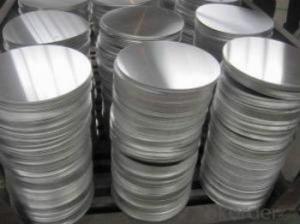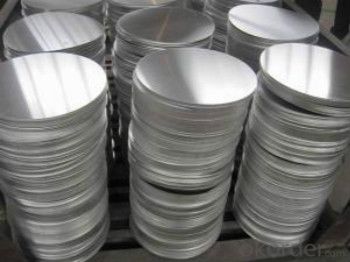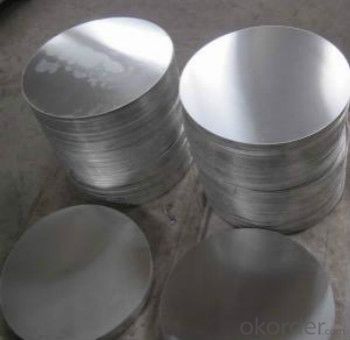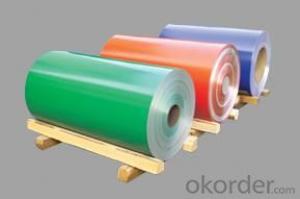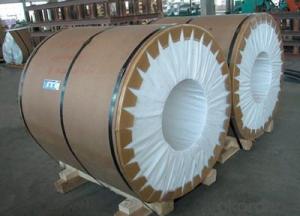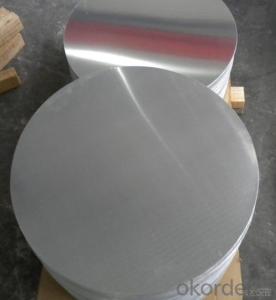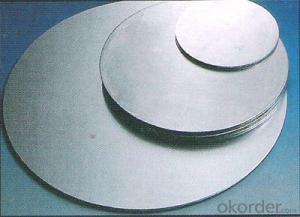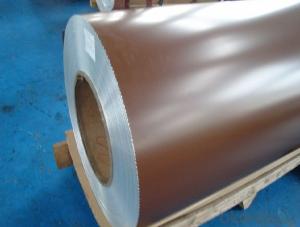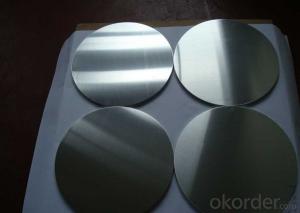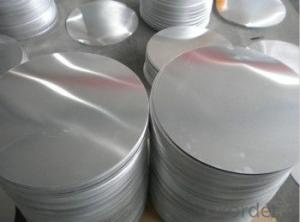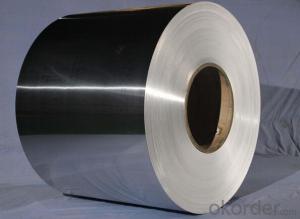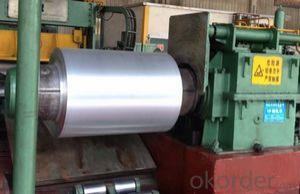3003 Mill Finished Continuous Casting Coil Aluminum Circle
- Loading Port:
- Shanghai
- Payment Terms:
- TT OR LC
- Min Order Qty:
- 5 m.t.
- Supply Capability:
- 2000 m.t./month
OKorder Service Pledge
OKorder Financial Service
You Might Also Like
Specification
1. Structure of CC Aluminium in Coil Form for making Aluminium Circle Description
CC Aluminium in Coil Form for making Aluminium Circle is one semi-finished aluminium material. This coil can be rolled down to aluminium coil,sheet,circle ect. The alloy AA1050 is widly used in building, industry ect. Its weight is much lower than steel. So many customers choosed aluminium material instead of steel.
2. Feature of CC Aluminium in Coil Form for making Aluminium Circle
Surfact Quality :
Be free from Oil Stain, Dent, Inclusion, Scratches, Stain, Oxide Dicoloration, Breaks, Corrosion, Roll Marks, Dirt Streaks and other defect which will interfere with use,
Mechenical Property:
Chemical Composite and Mechanical Property
3. Image of CC Aluminium in Coil Form for making Aluminium Circle
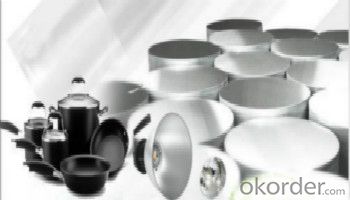
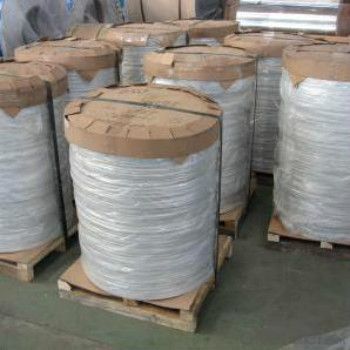
4. Specification of CC Aluminium in Coil Form for making Aluminium Circle
Aluminum Coil/Sheet | |
Main Specification | |
Alloy | AA1xxx (AA1050, AA1060, AA1070, AA1100 etc.) |
AA3xxx (AA3003, AA3004, AA3005, AA3105 etc.) | |
AA5xxx, AA6XXX (AA5052,AA5083, AA5754, AA6061, AA6062 etc.) | |
AA8xxx(AA8011, AA8006 etc.) | |
Temper | H14,H16, H18, H22, H24, H26, H32,O/F, T4, T6, T651 |
Thickmess | 0.01mm-100mm |
Width | 30mm-1700mm |
Standard | GB/T 3880-2006/ASTM |
Special specification is available on customer's requirement | |
5. FAQ
1) What is the delivery time?
Depends on actual order, around 20 to 35 days
2) What is the QC system:
We have QC staff of 20 persons and advanced equipment, each production is with MTC traced from Aluminum ingot lot.
3) What market do you mainly sell to?
Australia, America, Asia, Middle East, Western Europe, Africa etc
4)What about payment term?
30% T/T in advance, balance against B/L COPY.
- Q: Can aluminum coils be used in packaging industries?
- Yes, aluminum coils can be used in packaging industries. Aluminum is lightweight, flexible, and has excellent barrier properties that protect the packaged products from moisture, oxygen, and light. It is commonly used for packaging food, beverages, pharmaceuticals, and other consumer goods due to its durability and ability to preserve product quality.
- Q: Is it possible to construct a bird feeder using an aluminum coil?
- <p>Yes, you can use an aluminum coil to make a bird feeder. Aluminum is lightweight, durable, and resistant to rust, making it a suitable material for outdoor use. To create a bird feeder, you can form the coil into a hanger or support structure, then attach a feeding platform or container where birds can access the food. Ensure the structure is stable and safe for birds to perch and feed. Remember to use appropriate tools and safety measures when working with aluminum, and consider painting or coating the coil to enhance its appearance and protect it from the elements.</p>
- Q: How do aluminum coils contribute to lightweight vehicle design?
- Aluminum coils play a crucial role in achieving lightweight vehicle designs due to their unique properties and manufacturing processes. Aluminum is a lightweight material itself, weighing about one-third of the weight of steel, making it an ideal choice for lightweight vehicle design. When aluminum is formed into coils, it provides several benefits that contribute to the overall weight reduction of the vehicle. Firstly, aluminum coils are highly formable, allowing complex shapes to be achieved using less material. This property enables automakers to design intricate body panels and structural components that are not only lightweight but also offer improved aerodynamics and fuel efficiency. The ability to form aluminum coils into intricate shapes also allows for increased design flexibility, leading to more innovative and visually appealing vehicle designs. Secondly, aluminum coils offer exceptional strength-to-weight ratio, making them an excellent choice for structural components. Despite being lightweight, aluminum coils provide excellent structural integrity, ensuring the vehicle's safety and durability. By incorporating aluminum coils into the vehicle's chassis, suspension systems, and other critical components, automakers can reduce weight while maintaining the necessary strength and rigidity required for safe operation. Furthermore, aluminum coils have excellent corrosion resistance, which is essential for the longevity of the vehicle. Corrosion can significantly impact a vehicle's structural integrity and overall performance. By using aluminum coils, automakers can reduce the risk of corrosion-related issues, leading to longer lifespan and reduced maintenance costs. Lastly, the use of aluminum coils helps in reducing the overall weight of the vehicle, resulting in improved fuel efficiency and reduced greenhouse gas emissions. Lighter vehicles require less energy to accelerate and maintain speed, leading to better fuel economy. This benefit is increasingly important as the automotive industry focuses on developing more sustainable and eco-friendly vehicles. In conclusion, aluminum coils contribute significantly to lightweight vehicle design by offering high formability, exceptional strength-to-weight ratio, corrosion resistance, and overall weight reduction. These properties enable automakers to design vehicles that are not only lighter but also safer, more fuel-efficient, and visually appealing. As the demand for lightweight vehicles increases, aluminum coils play a vital role in achieving these design goals.
- Q: Can aluminum coils be used in the manufacturing of beverage cans?
- Yes, aluminum coils can be used in the manufacturing of beverage cans. Aluminum is a commonly used material for manufacturing beverage cans due to its various advantages. Aluminum coils are typically rolled into thin sheets, which are then cut, formed, and coated to create the final can shape. These coils provide a lightweight, durable, and corrosion-resistant material that is suitable for storing and preserving beverages. Additionally, aluminum is a highly recyclable material, making it an environmentally friendly choice for beverage can production.
- Q: What are the different sizes and dimensions of aluminum coils available?
- The specific industry and application determine the sizes and dimensions of aluminum coils, which can vary. Various widths, thicknesses, and lengths are generally available to cater to different needs. In the construction sector, aluminum coils are typically found in widths ranging from 24 to 60 inches. The thicknesses can vary from 0.019 to 0.040 inches. While the lengths of the coils can differ, standard lengths are usually around 100 feet or more. For industrial and manufacturing purposes, the sizes and dimensions of aluminum coils can be even more diverse. Coils wider than 60 inches are available for large-scale applications. The thicknesses can range from 0.006 inches for slim, lightweight coils to 0.250 inches for heavy-duty applications. Moreover, the dimensions of aluminum coils can be customized to meet specific requirements. Some manufacturers offer coil slitting services to cut coils into narrower widths, while others can provide custom lengths or thicknesses based on customer specifications. It is worth noting that the availability of different sizes and dimensions may vary among suppliers. Therefore, it is advisable to consult a reputable aluminum coil supplier or manufacturer to determine the specific sizes and dimensions they offer.
- Q: This question asks for an explanation of the various types of coatings that can be applied to aluminum coils.
- <p>Aluminum coils can be coated with several types of materials to enhance their properties for various applications. The main types include: 1. Anodized Coatings: These provide a protective oxide layer on the aluminum surface, enhancing corrosion resistance. 2. PVDF (Polyvinylidene Fluoride) Coatings: Known for their durability and resistance to UV rays, chemicals, and weathering. 3. Polyester Coatings: These are used for general-purpose applications due to their balance of properties like formability and chemical resistance. 4. PVF2 (Polyvinylidene Fluoride) Coatings: Similar to PVDF but with a thinner film, offering good weather resistance. 5. Acrylic Coatings: Known for their flexibility and adhesion, suitable for both interior and exterior applications. 6. Silane Coatings: Provide a thin, protective layer that enhances paint adhesion and corrosion resistance. Each type serves different purposes, and the choice depends on the specific requirements of the application.</p>
- Q: What are the different thickness tolerances for aluminum coils?
- The different thickness tolerances for aluminum coils can vary depending on the specific application and industry standards. However, common thickness tolerances for aluminum coils range from +/- 0.002 inches to +/- 0.010 inches, ensuring precision and consistency in the manufacturing process.
- Q: What are the different widths available for aluminum coils?
- The different widths available for aluminum coils can vary depending on the manufacturer and specific application. However, the most common widths for aluminum coils range from as small as 12 inches up to 60 inches or more. These widths are typically measured in inches and can be customized to fit specific industrial or commercial needs. The selection of the appropriate width for aluminum coils is crucial as it directly affects the efficiency and effectiveness of various processes such as manufacturing, construction, and transportation. Additionally, the width of aluminum coils can also impact the cost and availability of the material, making it an important consideration for both buyers and suppliers.
- Q: This question asks for criteria or methods to determine if a used aluminum coil is safe for reuse.
- <p>To determine if a used aluminum coil is safe to use, consider the following: Check for any visible signs of damage such as cracks, dents, or corrosion. Ensure the coil has been properly cleaned and sanitized to remove any residues or contaminants. Verify that the coil has not exceeded its recommended lifespan or usage limits. Consult the manufacturer's guidelines for any specific safety checks or maintenance requirements. If in doubt, it's best to consult with a professional or replace the coil to avoid potential safety hazards.</p>
- Q: Are aluminum coils suitable for aerospace applications?
- Indeed, aluminum coils are well-suited for aerospace applications. The aerospace industry extensively employs aluminum owing to its exceptional characteristics, including its lightweight nature, high strength-to-weight ratio, resistance to corrosion, and commendable thermal conductivity. These attributes render aluminum coils highly suitable for an array of aerospace purposes, encompassing the construction of aircraft structures, wings, fuselage, and engine components. Moreover, the malleability of aluminum coils facilitates their effortless transformation into diverse shapes and sizes, thereby enabling efficient manufacturing and customization. Ultimately, integrating aluminum coils into aerospace applications not only enhances fuel efficiency and diminishes overall weight but also improves performance and durability in demanding environments.
Send your message to us
3003 Mill Finished Continuous Casting Coil Aluminum Circle
- Loading Port:
- Shanghai
- Payment Terms:
- TT OR LC
- Min Order Qty:
- 5 m.t.
- Supply Capability:
- 2000 m.t./month
OKorder Service Pledge
OKorder Financial Service
Similar products
Hot products
Hot Searches
Related keywords
